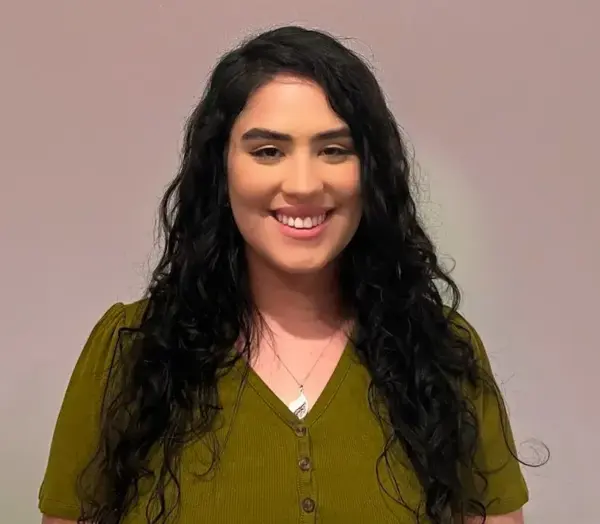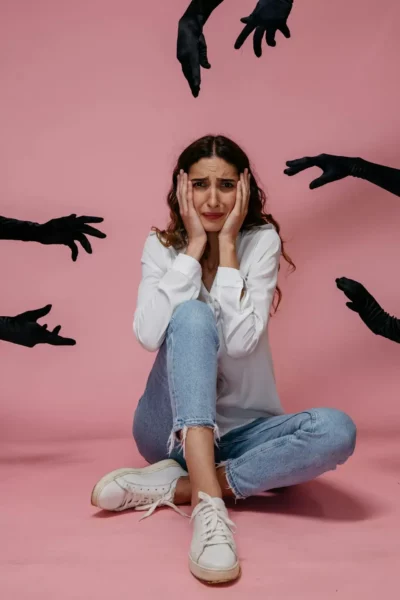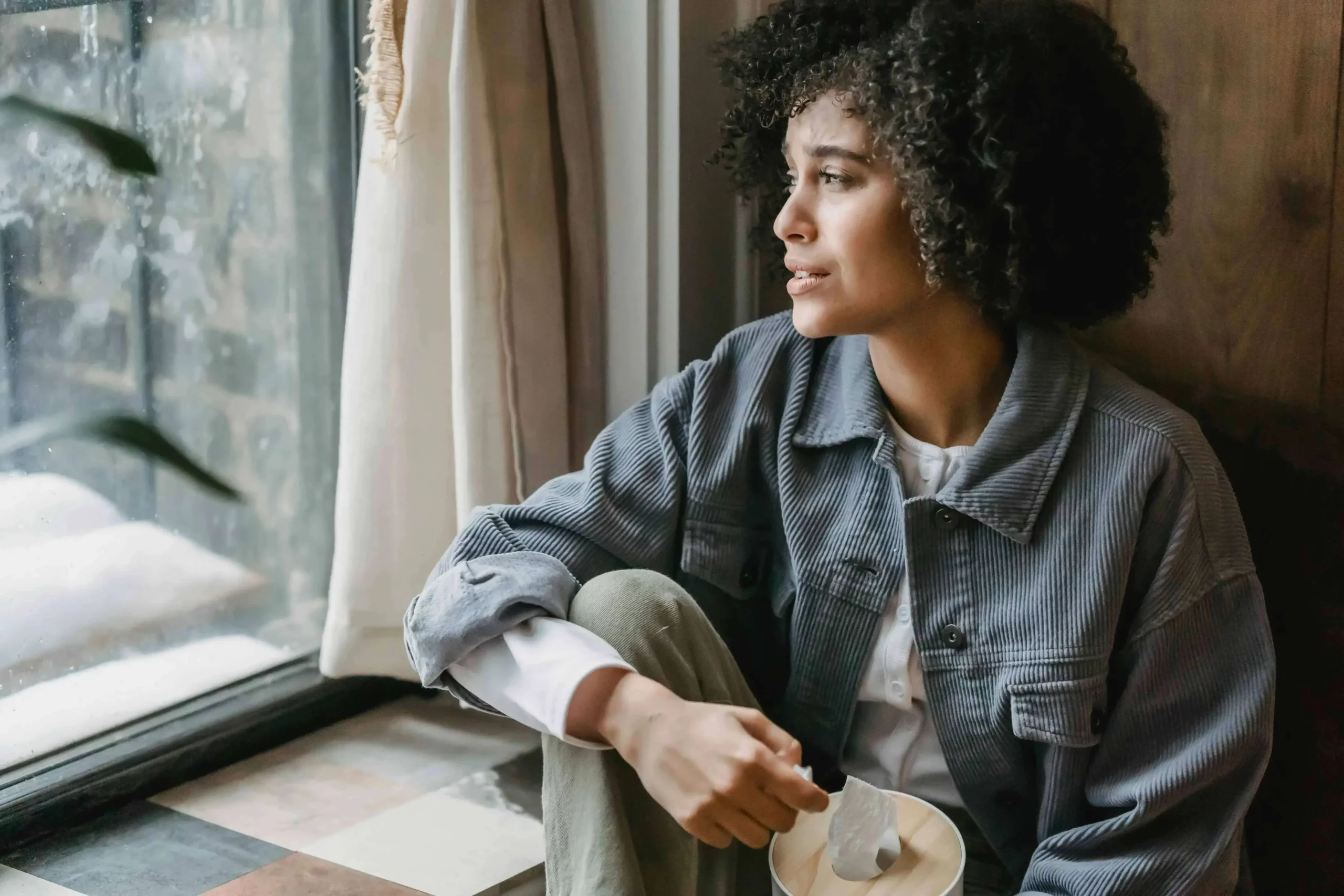10 Natural Anxiety Solutions
That Actually Work
Get Help for...
Feeling overwhelmed by anxiety & looking for a natural anxiety solution? You’re not alone. Millions of people struggle with anxiety daily, searching for effective, natural ways to find relief. The good news? Science-backed solutions exist that can help you manage anxiety naturally without relying on medication. Below, we’ll explore 10 natural anxiety solutions that are easy to implement and have been proven to work
Natural Anxiety Solution 1:
Mindfulness Meditation
Mindfulness meditation is a powerful tool to help calm your mind and stay present. Studies show that regular meditation can significantly reduce symptoms of anxiety and stress.
How to practice mindfulness:
- Find a quiet place, sit comfortably.
- Bring your focus to your breath, breathing in through the nose and out through the mouth.
- Observe your thoughts without judgment.
Start with just 5 minutes a day and gradually increase.
👉 Pro Tip: Use meditation apps like Calm or Headspace for guided sessions.
Tip #2. Regular Exercise to Lower Anxiety
Exercise isn’t just for your body; it’s great for your mind too! Physical activity releases endorphins—your body’s natural mood boosters—helping to relieve anxiety and improve your overall mental well-being.
Best exercises for a natural anxiety solution include:
- Walking in nature (forest bathing)
- Yoga and stretching exercises
- High-intensity interval training (HIIT)
📊 Did you know? A 2021 study found that just 30 minutes of aerobic exercise can reduce anxiety symptoms for up to 12 hours.

3. Herbal Remedies as a Natural Anxiety Solution
Herbs have been used for centuries to promote relaxation and calmness. Most Effective Herbal Remedies for Anxiety may include:
- Chamomile: Known for its calming properties, chamomile tea can ease stress.
- Ashwagandha: An adaptogenic herb that helps the body cope with stress.
- Valerian Root: Promotes relaxation and better sleep.
⚠️ Caution: Always consult with a healthcare provider before trying herbal supplements, especially if you take medications.
4. Decrease Anxiety with Quality Sleep
Poor sleep is a major contributor to anxiety. Establishing a consistent sleep routine can help regulate your mood and stress levels.
Tips for better sleep:
- Stick to a regular sleep schedule.
- Avoid screens before bedtime.
- Create a calming bedtime ritual, such as reading or deep breathing exercises.
😴 Struggling with sleep? Try drinking a cup of warm milk or herbal tea before bed.
5. Eat a Nutrient-Dense Diet
What you eat affects your mental health. A well-balanced diet rich in vitamins, minerals, and omega-3 fatty acids can naturally alleviate anxiety symptoms.
Anxiety-fighting foods:
- Fatty fish (salmon, sardines)
- Nuts and seeds (almonds, chia seeds)
- Dark leafy greens (spinach, kale)
- Probiotic-rich foods (yogurt, kefir)
🥑 Eat your way to a calmer mind with a Mediterranean-style diet!
6. Limit Caffeine & Alcohol To Reduce ANxiety
Both caffeine and alcohol can exacerbate anxiety symptoms. Caffeine stimulates the nervous system, while alcohol can disrupt sleep patterns and mood stability.
Alternatives to try:
- Herbal teas like lemon balm or passionflower
- Decaf coffee or green tea
- Infused water with fresh fruit and herbs
🚫 Cutting back on caffeine can lead to noticeable improvements in your anxiety levels.
7. Practice Deep Breathing Exercises
Controlled breathing techniques can help reduce anxiety in the moment by activating the body’s relaxation response.
Effective breathing techniques:
- 4-7-8 Breathing: Inhale for 4 seconds, hold for 7, exhale for 8.
- Box Breathing: Inhale, hold, exhale, hold—each for 4 seconds.
- Diaphragmatic Breathing: Breathe deeply into your belly, not just your chest.
🧘♀️ Use deep breathing to calm anxiety before important events.
8. Nature Therapy as a natural anxiety solution
Nature therapy, also known as “ecotherapy,” has been shown to reduce stress hormones and promote mental well-being.
Ways to incorporate nature therapy to reduce anxiety
- Take regular walks in green spaces.
- Practice grounding by walking barefoot on grass.
- Try gardening as a calming hobby.
🌿 Being in nature for at least 20 minutes a day can significantly lower stress levels.
9. Engage in Creative Outlets
Engaging in hobbies provides a sense of purpose and accomplishment and is a fun option for anyone looking to reduce anxiety.
Creative activities that are natural anxiety solutions may include:
- Journaling
- Painting
- Writing
- Playing music
10. Seek Social Support
Connecting with friends, family, or support groups can provide emotional relief and perspective. Sharing your feelings with trusted individuals can help reduce anxiety and loneliness.
Ways to build a support system:
- Join a local or online support group.
- Engage in social activities, even if virtual.
- Consider therapy or counseling if needed.
💬 You don’t have to face anxiety alone—reach out for support.
Final Thoughts
Managing anxiety naturally is possible with the right lifestyle changes and practices. Whether it’s through mindfulness, diet, or spending time in nature, these solutions can empower you to take control of your mental health.
Start small, be consistent, and don’t hesitate to seek help when needed.
➜ Read More
Our Areas of Speciality
Therapy for Anxiety
Anxiety therapy is one of the most common reasons individuals come to therapy, and our expert therapists are ready to help you overcome anxiety and reclaim your life.
Therapy for OCD
Online therapy for OCD gives clients the skills to break from the patterns of OCD, employing proven strategies to overcome OCD & reclaim the joy of life.
Therapy for Depression
Getting therapy for depression may feel overwhelming, but our depression therapists are compassionate and effective in treatment for depression in New Jersey.
Therapy for Stress
Therapy for stress management will help you adapt how you respond to life’s challenges, allowing you to live with more peace, focus, and joy.
Therapy for Phobias
Online therapy for phobias helps clients manage and overcome fear and panic. Our dedicated team is here to support you on your journey to reclaim your life.
Therapy for Trauma
Trauma Counseling serves as a valuable tool for individuals struggling with symptoms related to PTSD & stress.
Therapy for Grief
Online grief counseling offers a space to understand and process your feelings, ensuring that whatever the source of your grief, you’re not navigating this journey alone.
Therapy for Teens
Online therapy for teens includes options for creative art therapies, VR therapy as well as traditional talk therapy for teens.
Our Therapy Approaches
Ketamine Assisted Therapy
Ketamine Assisted Therapy has been shown to reduce the symptoms of PTSD, depression, anxiety, chronic pain and more.
Virtual Reality Therapy
Virtual Reality Therapy helps clients overcome phobias, anxiety disorders, and other mental health conditions by exposing them to their fears in a controlled, safe environment.
Expressive Art Therapy
Art can be a helpful support tool in therapy to help with communication, expression, mindfulness & grounding.
Cognitive Behavioral Therapy
CBT is present-focused, making it especially effective for those seeking tangible results.
Emotion-Focused Therapy
In EFT sessions, the therapist and client work together & the therapist assists clients in deciphering their emotions rather than imposing interpretations.
Exposure Therapy
Through exposure therapy, our therapists will introduce you to the very things that trigger your fear.
Where are you located? I need a therapist near me
We are fully online, which means that your therapy sessions will be help via video call on our HIPAA compliant Platform. Anyone in New Jersey can access our therapy services
How do I get started as a new client?
New Clients can reach out to us directly via call, text or email here:
Does my insurance cover my visits?
We provide”Courtesy Billing” for clients who are using the Out-of-network insurance benefits.
Our Insurance Page might answer your questions about your insurance information, cost and OON coverage.
What are out-of-network benefits?
Visits our FAQ About Insurance to learn more about OON coverage for mental health services. We can also check your benefits for you. When using OON benefits, patients typically pay the full cost of the treatment upfront and then file a claim with their insurance company for reimbursement.
Is Online Therapy As Effective As In-Person Therapy?
Online therapy is essentially face-to-face counseling, just conducted remotely. Studies show that tele-therapy is as effective as traditional counseling. Professional organizations and state governments recognize its benefits and have set regulations for it. However, like any therapy, its success in achieving your goals isn’t guaranteed. It’s important to discuss with your therapist whether tele-therapy is working for you.
How Should I Prepare for My First Session?
Showing up is all that you need to do! But if you really want to get the most out of session, it could help to take some time to think about what you want from therapy. It helps to write down your goals, questions you have or things that you feel are important to share.
Do you offer traditional talk therapy?
of course! though we have some unconventional therapy approaches, we are rooted in evidenced based practices. Talk therapy is a major player in the therapy room! See What we Treat and Integrative Services for more information
Is Virtual Counseling Suitable for Everyone?
Online therapy might not be as effective for individuals with chronic suicidal thoughts, severe trauma, significant mental health history, or those recently in intensive care. Such cases often benefit more from traditional, in-person counseling. We’ll help you decide if our online services are right for you during your intake and evaluation.
Can I Change Therapists If I'm Not Happy?
Yes, you can switch therapists to another provider within the practice, or we can provide you a referral if preferred. We want to ensure that your time and effort are well spent, and that you are getting the relief you need, that’s why we work collaboratively with each other in the practice, as well as outside therapists who we know and trust.
How Do I Know If Therapy Is Helping?
You should feel like you’re making progress. Signs it’s working include:
- Feeling comfortable talking to your therapist
- Your therapist respects boundaries
- You’re moving towards your goals
- You feel listened to
You’re doing better in life - Your self-esteem is getting better
What is your cancellation policy?
We ask that clients provide at least 24 hours notice in the event that they need to cancel to avoid the 50% cancellation fee. we understand that life happens and do our best to be flexible & reschedule.
What Geographic Areas Are Served?
Currently, we serve clients in New Jersey and are expanding to other states as telehealth laws evolve. While telehealth offers the convenience of attending sessions from anywhere, state laws require clients to be in-state during their session.
Is Online Therapy Easy to Use for Non-Tech-Savvy People?
Yes, it’s pretty simple to access sessions. You’ll need basic internet skills, such as opening and visiting the patient link sent to you via email. It’s similar to video chatting like Facetime or Zoom. We can also walk you through it on the phone the first time to ensure a strong connection
What Questions Should I Ask My New Therapist?
Feel free to ask anything. Some good questions are:
- How often will we meet?
- What do you specialize in?
- What experience do you have with my issue?
- What outcomes can I expect?
- How will I know I’m progressing?
- How long do you usually work with clients?
- How will we set my treatment goals?
What is the difference between associate therapists & fully licensed therapists?
Our Qualifications:
Our founder, Rebecca Sidoti, is a highly qualified, state-licensed therapist and supervisor with extensive training in anxiety related disorders and innovative treatment such as Ketamine Therapy. Mind by Design Counseling adheres to standards set by the our governing counseling boards.
To see each providers credentials, training and licenses, visit our “Meet the Therapists” Page to learn more.
- LAC/LSW are therapists who may practice clinical work under the supervision of a fully licensed therapist.
- LPC/LCSW are therapists who have completed the necessary clinical hours post-graduation under supervision and can practice clinical work independently.
Can Anyone Benefit from Ketamine Assisted Psychotherapy?
KAP has shown promise for individuals with treatment-resistant depression and certain anxiety disorders. However, its efficacy can vary from person to person.
What Can Ketamine Assisted Psychotherapy Help to Treat??
Ketamine has shown promise in treating various mental health conditions, including PTSD, Anxiety, Depression, Phobias and OCD. As Ketamine therapy providers, we offer this service to help clients break cycles of thinking traps that lead to compulsive behaviors.
Is KAP the same as Ketamine infusions?
KAP is a therapeutic approach that combines the use of ketamine with psychotherapy. Our Process of providing ketamine assisted psychotherapy is different from ketamine infusions, which are typically administered without the accompanying psychotherapy. Our partnership with Journey Clinical provides patients with lozenges for self-administering their Ketamine dose prescribed by the Journey Clinical provider.
Is Ketamine Addictive?
While ketamine has the potential for misuse, when used in a controlled medical setting for therapeutic purposes, the risk of addiction is considered low according to medical researchers
What Neurotransmitters are effected by Ketamine?
Ketamine works by blocking NMDA receptors in the brain, which can lead to an increase in the release of certain neurotransmitters. This can result in rapid antidepressant effects
How does ketamine compare to other psychedelic medicines?
Ketamine is unique in its rapid antidepressant effects and mechanism of action. Other psychedelics, like psilocybin, have different mechanisms and therapeutic potentials.
How often would KAP be needed?
The frequency of KAP sessions would depend on the individual’s response to treatment and the medical provider’s recommendations.
What medical conditions might disqualify someone from KAP?
Certain medical conditions, such as uncontrolled hypertension or a history of psychosis, might be contraindications for KAP. See Our “Safety Measures” page for more information about the precautions that the medical team adheres to, along with other safety measure sin place.
How many ketamine treatment sessions do clients need for KAP?
The number of sessions can vary based on individual needs and the specific protocol followed by the provider. For Full details, visit the “Our Process” page. Generally 2-3 sessions are held prior to a dosing session, and then integration sessions are held after a dosing session. Depending on your treatment plan, there may be more or less number of sessions










